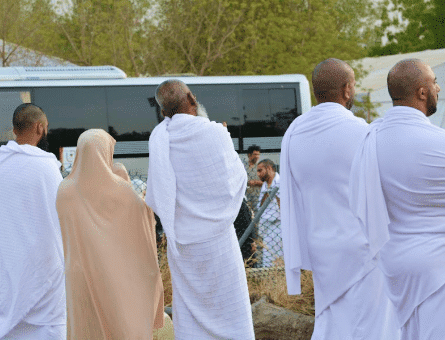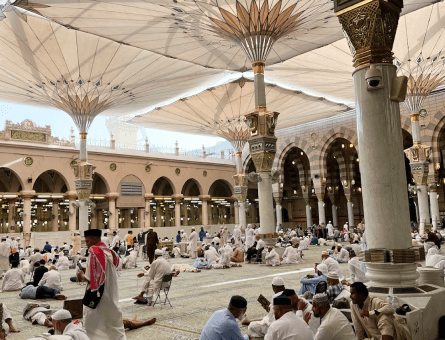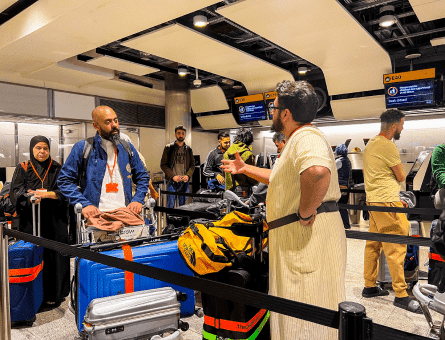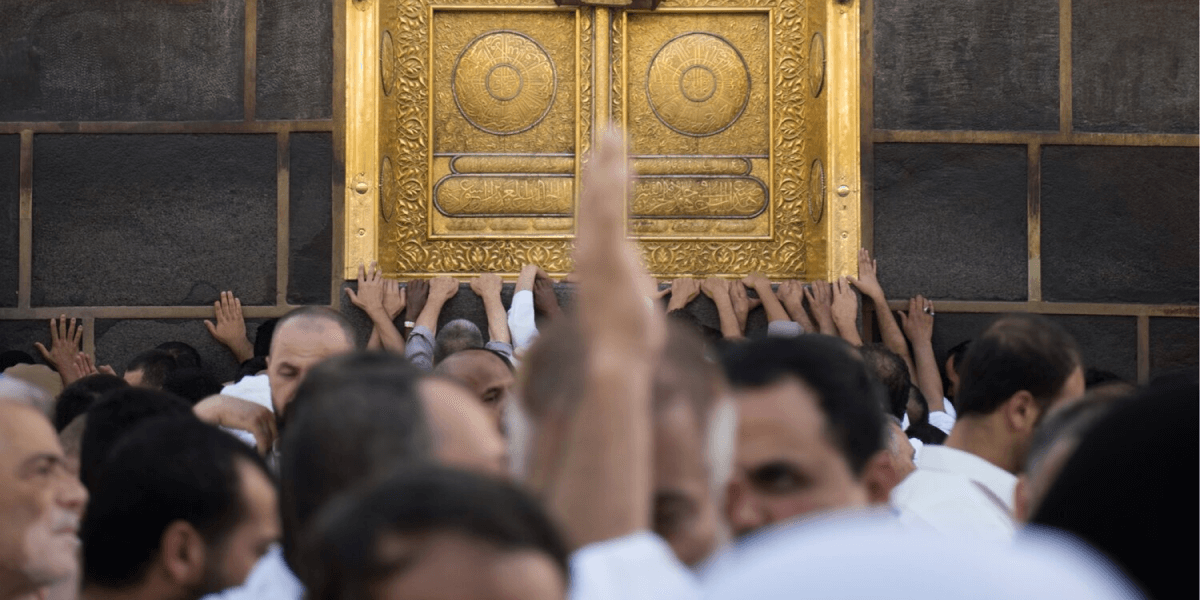History of Umrah – Everything you need to know about the lesser pilgrimage
Otherwise known as the Lesser Pilgrimage, Umrah is regarded as one of the most uplifting and purifying rituals in Islam. It is a Sunnah of Prophet Muhammad (PBUH) and a highly recommended spiritual act of worship for Muslims around the world.
Every year, millions of pilgrims undertake the journey to the holy city of Makkah, Saudi Arabia, with the intention to perform Umrah, seeking blessings and forgiveness for their sins.
However, like every other Islamic ritual, there’s a story behind the significance of Umrah and how it all began. In this article, we will be discussing the history of Umrah. So, without further ado, let’s begin.
What Is Umrah in Islam?
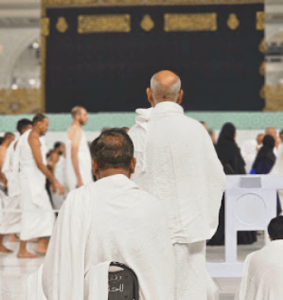 Umrah is an Arabic term that linguistically means ‘to visit a particular place.’ However, in light of the religion, Umrah is a visit to the House of Allah SWT, the Holy Kaaba in Makkah, Saudi Arabia, with the intention of performing the Lesser Pilgrimage.
Umrah is an Arabic term that linguistically means ‘to visit a particular place.’ However, in light of the religion, Umrah is a visit to the House of Allah SWT, the Holy Kaaba in Makkah, Saudi Arabia, with the intention of performing the Lesser Pilgrimage.
Umrah comprises several significant rituals, including crossing lines of Miqat, wearing the Ihram, performing Tawaf around the Holy Kaaba, running between the hills of Safa and Marwa (Sai), and carrying out Taqsir (trimming) or Halq (shaving) of the hair.
Muslims can perform Umrah at any point during the year. However, it is advised by Islamic scholars to avoid performing Umrah on the days of Hajj and Eid ul-Adha, that is, between the 8th Dhul Hijjah and the 13th of Dhul Hijjah.
In-Depth History of Umrah
According to Islamic teachings, the history of Umrah dates back to 622 CE, when Prophet Muhammad (PBUH) asked the Muslims of Makkah to migrate to Madinah in order to be safe from the persecutions at the hands of the Quraysh.
While the sacred city of Madinah brought much-needed peace and freedom to the lives of Muslims, the utmost desire to visit their homeland and perform Umrah resided in their hearts. In 6 AH (628 CE), the Messenger (PBUH) of Allah SWT saw a dream in which he was performing Umrah.
When Prophet Muhammad (PBUH) narrated the dream to his companions, they took it as a sign from Allah SWT and advised Prophet Muhammad (SAW) to perform Umrah.
Therefore, the Messenger (PBUH) of Allah SWT, along with 1400 companions, walked towards Makkah. However, when the idolaters heard about the huge caravan, they thought that the Muslims had actually come to attack them.
Considering this, as soon as Prophet Muhammad (PBUH) reached the outskirts of Makkah, he sent an emissary to the leaders of the Quraysh in order to inform them that they had only come with an intention to perform Umrah in peace and harmony.
However, the cowardly Quraysh refused to grant them entry, and so the Muslims had no choice but to wait at Hudaibiyyah as Prophet Muhammad (PBUH) didn’t wish to enter the Holy Kaaba forcefully.
Following this, diplomatic negotiations took place between the leaders of the Quraysh and Prophet Muhammad (SAW), resulting in both parties signing the 10-year peace treaty called the Treaty of Hudaibiyyah.
According to the terms therein, Muslims were granted permission to return to Makkah the next year in order to perform Umrah. Therefore, Prophet Muhammad (PBUH), along with his companions, returned to their homes without performing the Lesser Pilgrimage.
Complying with the terms of the treaty, in 229 CE, Prophet Muhammad (PBUH), along with 2000 companions, women and children included, entered Makkah to perform the first-ever Umrah in Islamic history.
Ibn al-Qayyim said, “He did ‘Umrah four times after the Hijrah, four ‘Umrahs, all of them in Dhu’l-Qi’dah. The first was the ‘Umrah of al-Hudaybiyah, which was the first of them in 6 AH, but the mushrikin prevented him from reaching the House (the Kaaba), so he offered the sacrifice (of camels) when his way was blocked at al-Hudaybiyah, and he and his Companions shaved their heads and exited the state of ihram, and went back in the same year to Madinah.
The second was the Fulfilled ‘Umrah in the following year when he entered Makkah and stayed there for three (days), then he left after completing his ‘Umrah.
The third was the ‘Umrah which he did along with his Hajj. The fourth was his ‘Umrah from al-Ja’rranah, when he went out to Hunayn, then he came back to Makkah and performed ‘Umrah from al-Ja’rranah. He said: There is no (scholarly) dispute concerning the fact that he did no more than four ‘Umrahs.” (Zad al-Ma’ad, vol. 2, p. 90-93)
What Is the Purpose of Umrah?
Allah SWT in the Holy Quran says, “Accomplish Hajj and Umrah to please Allah.” [Holy Quran]
The purpose of Umrah is to connect with Allah SWT with the intention to achieve the Almighty’s blessings, mercy, and forgiveness and to purify one’s soul of all sins. There are countless virtues and rewards associated with performing Umrah for the sake of Allah SWT.
Any pilgrim invited to perform Umrah is lucky to do so and in order to maintain spirituality after completing Hajj, one may want to place more priority into performing additional sunnah prayers and frequent dhikr and Quran recitation until it becomes pure habit
Prophet Muhammad (PBUH) said, “The guests of Allah are three: The Ghazi (the warrior who fights in Jihad just for the sake of Allah), the Hajji (the pilgrim who performs Hajj), and the Mu’tamir (the pilgrim who performs Umrah).”
In light of Allah SWT’s promise to expiate the sins of the pilgrim, the Messenger (PBUH) said, “From one Umrah to another is expiation for what comes in between, and ‘Hajj Al-Mabrur’ brings no reward less than Heaven.”
How Long Is Umrah?
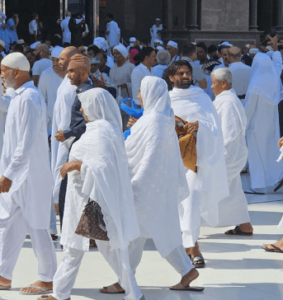 The minimum time that a pilgrim is required to perform Umrah is three to six hours, depending on different days and the number of pilgrims present on the grounds of Masjid al-Haram in Makkah.
The minimum time that a pilgrim is required to perform Umrah is three to six hours, depending on different days and the number of pilgrims present on the grounds of Masjid al-Haram in Makkah.
Is Umrah Compulsory for Muslims?
Otherwise known as the ‘Minor Pilgrimage, Umrah is not compulsory for Muslims. However, performing Umrah is a Sunnah of Prophet Muhammad (PBUH). Therefore, if you are physically and financially able, it is highly recommended to perform Umrah at least once in your lifetime.
Jaabir narrated that once a companion asked Prophet Muhammad (PBUH) whether ‘Umrah is obligatory. The Messenger (PBUH) of Allah SWT replied, “No, but if you do Umrah, it is better.”
Difference Between Hajj and Umrah
Hajj and Umrah are two spiritual journeys undertaken by believers to seek inner peace and the blessings of Allah SWT. Performing the rituals of the pilgrimage (major and minor) gives one the chance to earn the spiritual reward, gain forgiveness, and an opportunity for self-renewal.
Even though both Hajj and Umrah comprise certain common rites that are performed by pilgrims, overall, they differ more than you might expect. Some major differences between Hajj and Umrah are as follows:
Hajj, the annual pilgrimage is the fifth pillar of Islam. Therefore, it is mandatory for all physically and financially able Muslims to perform Hajj at least once in their life. On the other hand, Umrah isn’t a pillar of Islam. So, even though it isn’t obligatory to perform Umrah, it is highly recommended.
“Umrah is an optional pilgrimage and a Sunnah which brings unlimited blessings, but it is not a requirement of Islam. In terms of spiritual weightage, Hajj holds more value since is renews the Muslim as if they were born again.”
Furthermore, while it is essential to perform Hajj within a prescribed time period, specifically in the first ten days of Dhul Hijjah, Umrah, on the other hand, can be performed at any time of the year except the 8th to 13th of Dhul Hijjah, which are the days of Hajj.
In comparison to Umrah, Hajj is a more comprehensive process. The rituals of Umrah include Ihram, Tawaf, Sai, drinking Zamzam water, and cutting/shaving the hair on the head. In addition to these rituals, Hajj comprises rites such as spending time in Mina, Arafat, and Muzdalifah, stoning of the devil (Rami al Jamarat), and performing Qurbani (sacrifice) for the sake of Allah SWT.
What Is the Reward for Performing Umrah?
Being humans, we tend to sin. Umrah gives one a chance to get a clean slate and purify their body and soul from the burden of past sins. Abu Hurairah (RA) narrated that the Messenger (PBUH) of Allah SWT said, “The pilgrims performing Hajj and Umrah are a delegation to Allah. If they call upon Him, He will answer them; and if they ask for His forgiveness, He will forgive them.” (Narrated in Sunan Ibn Majah)
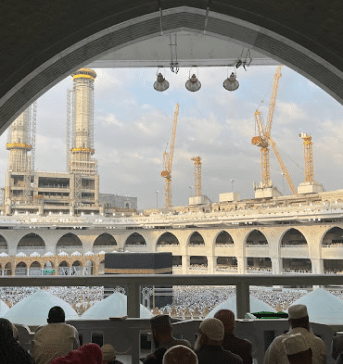 He also reported that Prophet Muhammad (PBUH) said, “(The performance of) Umrah is an expiation for the sins committed (between it and the previous one). And the reward of Hajj Mabrur (the one accepted by Allah) is nothing except Paradise.” (Narrated in Sahih al-Bukhari)
He also reported that Prophet Muhammad (PBUH) said, “(The performance of) Umrah is an expiation for the sins committed (between it and the previous one). And the reward of Hajj Mabrur (the one accepted by Allah) is nothing except Paradise.” (Narrated in Sahih al-Bukhari)
Jihad in Islam literally means to strive and struggle for the sake of Allah SWT. While the reward for Jihad is martyrdom, the closest way to earn the reward equivalent to Jihad is to perform Umrah, especially for the weak, young, and elderly.
Prophet Muhammad (PBUH) said, “Jihad of an elderly, young, weak and the women is Hajj and Umrah.”
In another instance, the Messenger (PBUH) said, “The warrior in the foundation of Allah, the pilgrim, and the one who is performing Umrah are all the allocation of Allah. He called them, and they answer back, and they will ask of His conferrals, and He will give it to them.”
A Muslim who spends his wealth to visit the House of Allah SWT (Holy Kaaba), the Almighty blesses the believers with wealth. Ayesha (RA) said, “Whoever foliage his house for the sake of obstinacy of Hajj or Umrah and dies, nothing will be accessible to him, nor will he have any accountability on the day of judgment and it will be said to him, enter to Heavens.”
Furthermore, while Umrah can be performed anytime of the year, Ibn Abbas (RA) reported that Prophet Muhammad (PBUH) said, “Umrah performed in the month of Ramadan will equal (in rewards) to that of Hajj or Hajj performed with me.” (Bukhari, Muslim)
How Many Times Did Prophet Muhammad (SAW) Perform Umrah?
According to Islamic scriptures, Prophet Muhammad (PBUH) performed Umrah four times throughout his life. Three out of the four Umrahs were performed in Dhil Qidah except for the last Umrah, which he (PBUH) performed with Hajj.
Qatadah narrated that Anas (may Allah be pleased with him) told him that the Messenger (PBUH) of Allah SWT performed “Umrah four times, all of them in Dhu’l-Qi’dah apart from the ‘Umrah which he performed with his Hajj. He performed ‘Umrah from al-Hudaybiyah or at the time of al-Hudaybiyah in Dhu’l-Qi’dah; (he did) ‘Umrah the following year in Dhu’l-Qi’dah; and (he did) ‘Umrah from Ja’rranah when he shared out the booty of Hunayn in Dhu’l-Qi’dah.” (Narrated by al-Bukhari, al-Hajj, 1654; Muslim, al-Hajj, 1253)
Summary – History of Umrah
The last messenger of Allah SWT, Prophet Muhammad (PBUH) dedicated his life to showing people the true light and the way to live a righteous life. He (PBUH) considered Umrah to be one of the best ways to worship Allah SWT and seek His blessings and forgiveness.
According to Islamic history, the Messenger (PBUH) of Allah SWT performed Umrah four times during his life. Umrah is a special form of worship that directly connects the believers to Allah SWT, the Creator of the entire universe, giving them a chance to repent for their sins and become better Muslims.
Explore The New Pilgrim App
The Ultimate App
for Hajj and Umrah!









